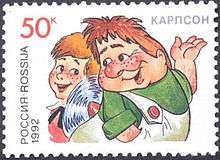Karlsson-on-the-Roof
 Karlsson with Lillebror (little brother) on a Russian stamp (1992). | |
|
Karlsson-on-the-Roof Karlsson Flies Again Karlsson-on-the-Roof is Sneaking Around Again | |
| Author | Astrid Lindgren |
|---|---|
| Original title | Karlsson på taket |
| Country | Sweden |
| Language | Swedish |
| Media type | Print (hardcover and paperback) |
Karlsson-on-the-Roof (Swedish: Karlsson på taket) is a character who figures in a series of children's books by the Swedish author Astrid Lindgren. A cartoon adaptation of the series became popular in the Soviet Union when it was released in the 1970s. These adaptations are still celebrated to this day as an integral part of the Russian cartoon industry. Karlsson, together with Cheburashka and other such characters, are recognized as a national icon. Lindgren may have borrowed the idea for the series from a similar story about Mr. O'Malley in the comic strip "Barnaby" (1942) by Crockett Johnson.[1]
Plot
Karlsson is a very short, portly and overconfident man who lives in a small house hidden behind a chimney on the roof of a very ordinary apartment building on a very ordinary street in Stockholm. When Karlsson pushes a button on his stomach, it starts a clever little motor with a propeller on his back, allowing him to fly. Karlsson is the best at everything, at least by his own account. In actual fact there is one thing at which he excels: being a playmate to a young boy named Svante, nicknamed Lillebror (little brother), who lives in the apartment building with his family.
Karlsson is quite mischievous, often getting Lillebror in trouble, but everyone in the end - even Lillebror's family, his cranky uncle, and their dour housekeeper - grow to like Karlsson and appreciate his sense of humour, energy, and good nature.
Series
There are three Karlsson-on-the-Roof books:
- 1955: Karlsson-on-the-Roof (ISBN 0670411779)
- 1962: Karlsson Flies Again
- 1968: Karlsson-on-the-Roof is Sneaking Around Again
Adaptations

There have been several film versions of the series. A live-action version, Världens bästa Karlsson, was released in Sweden in 1974, as was an animated film in 2002.
The two Soviet animated films, directed by Boris Stepantsev at Soyuzmultfilm studio in 1968 and 1970, are two of the most celebrated and loved cartoons in Russia and other ex-Soviet countries. Karlsson was voiced by Vasily Livanov and Fröken Hildur Bock by Faina Ranevskaya in both animated films. In 1971, the character was also adapted on the Soviet stage at the Moscow Satire Theatre, where Karlsson was portrayed by Spartak Mishulin.
Merchandise
The Russian designer Lev Razumovsky created a Karlsson toy [2] in the 1970s.